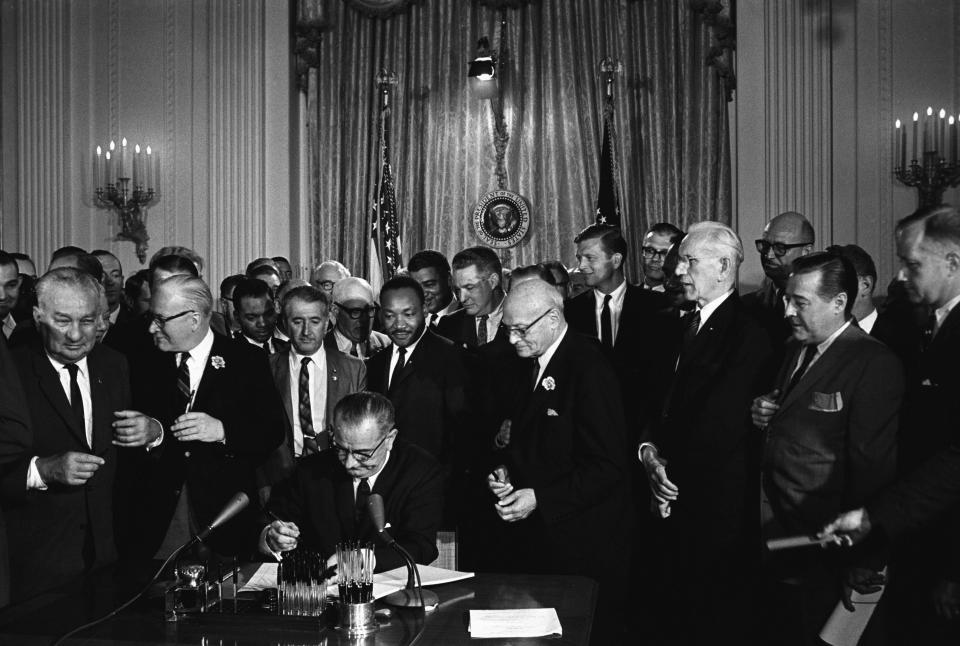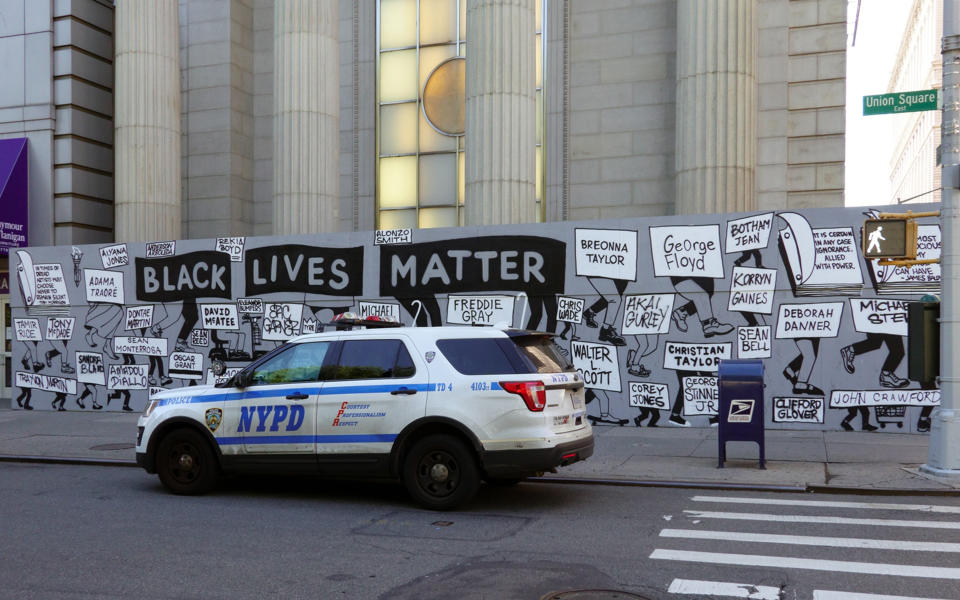What does it mean to be Black in America? ‘A legacy of profound resilience’
“The hard truth is that the United States was built with white supremacy as its foundation and is still riddled with systemic injustice,” says Kirstyn Nimmo, founder and managing director of GOOD WORX, a social innovation consultancy. “Race was created and used to create challenges for Black people that have persisted for over 400 years.”
When I think about what it means to be Black in America, it means to be both from a legacy of profound resilience, a legacy of survival, and... a legacy of deep sorrow. Sonya Renee Taylor, author, poet, social justice activist and educator
What does it mean to be Black in America?
This past June, Merriam-Webster dictionary changed the definition of racism to reflect systemic oppression, defining it as “a political or social system founded on racism and designed to execute its principles.” The change was made in response to the death of George Floyd and the demands of activists to include the nuance of systemic racism in the definition.
Taylor and Nimmo are two of 10 influential experts and activists, along with dozens of creators, that participated in the virtual launch of the Yahoo Allyship Pledge, a six month program hosted by Yahoo that brings together leading voices to discuss urgent issues involving race in America, and creates actionable tools for Allyship.
At the Yahoo Allyship Pledge launch event, experts discussed the roots of systemic racism in institutional practices, laws and policies that subjugate Black Americans to oppression and violence.
What does it mean to be an ally?
Allyship is a consistent and arduous practice of unlearning and re-evaluating, where a person holding privilege and power actively seeks to end oppression in solidarity with those who are systemically marginalized. A key component of Allyship is acknowledging systemic racism and taking time to self-educate on the concept, and how it creates inequities and inequalities that impact your personal life as well as the lives of those around you.
Understanding a system of racism
Black America is multifaceted — with a rich history of resilience and creation of new cultural traditions, while still being subjected to extreme acts of aggression and violence from slavery. “It's hard to find any people in the modern world who have been hated so intensely for 400 years, yet still teach the world so much about how to love,” says political activist, social critic and author Cornel West on the complexity experienced by Black Americans. His reference highlights the historical strides and efforts of Black Americans who developed and shaped the country, such as those illuminated in the 1619 Project by the New York Times. Black Americans have continuously excelled, despite systematic efforts that aimed to halt their progress.
“To be Black in America is to be asked to save a democracy that doesn't love you — to be asked to exist within a society that wants to mimic and take part of your identity without fully embracing it, when it lives on you,” says Jamira Burley, activist and head of Youth Engagement and Skills at the Global Business Coalition for Education.
“So much of our system and so much of our ideals and values are based upon race. But we never spend any time talking about, where did race come from? It is not something that just naturally organically happens,” says Joy Banner, director of marketing for the Whitney Plantation, a museum in Louisiana that focuses on the lives of enslaved people. She says the U.S. didn’t have laws mentioning race until the 1750s. “That's when we see an introduction of race. That's when we're seeing ethnicities being categorized against whites vs. Blacks, we see white people that are being incentivized to treat and to recognize the enslavement of African descendants.”
Despite the Civil Rights Act of 1964, which provided Black Americans with the opportunity to vote and equal access to the nation’s institutions, Taylor says the structures of systematic injustice remain.
“It didn’t magically go away one day because the United States decided to fight a war and then get rid of slavery. What lives inside of that are all the systems and structures that got created, and that were baked inside,” she says.

Black Lives Matter: ‘Don’t kill us’
However, this summer’s Black Lives Matter protests, organized in response to the deaths of individuals including George Floyd, Breonna Taylor, Elijah McClain and Dominique "Rem'mie" Fells, displayed a social and political movement towards the disinvestment of these structures.
“Right now, we're literally fighting for this idea of Black Lives Matter. And one thing I always tell people is, like, Black Lives Matter, does it mean Black Lives prosper? It doesn't mean Black lives have more than… it has nothing to do with being better tomorrow. It's like, Hey, we just don’t want to die. Right? Like, don't kill us,” says Fredrick Joseph, author of The Black Friend, On Being a Better White Person.
Social justice advocate Jamira Burley imagines a world not where people don’t see differences, “but that we don't see differences as a negative... that we see differences as something that adds flavor to our entire world that we celebrate — that we're inspired by.”

Moving forward: ‘Understand the truths of Black history’
“What would it look like if everybody was free? What would it look like if everybody was living in their own power, and in their own strength, and they're bringing their all to the table, and they have the same opportunities to be able to transform the world around them to make it a better place for all of us to live?” asks Nicole Cardoza, social entrepreneur, investor and founder of the newsletter Anti-racism Daily.
Jeffrey Robinson, director of the American Civil Liberties Union’s (ACLU) Trone Center for Justice and Equality, says one way to change systemic racism is to inform and educate voters. “If voters had the depth of information that this series [Yahoo Allyship Pledge] is promoting, with all of the different folks that are talking… I think people would be thinking, ‘you know what? We have to try something different,’” he says. “There actually is a connection between racism and the way this particular issue is existing right now, today, in November 2020. And that's not acceptable. And in order to fix it, I can't just look at what's happening right now, this minute. That would be ignorant. I have to look back to make sure I understand the cause of what brought us to this moment, because if I ignore the cause, I will come up with a solution that doesn't work.”
A future where Black people are treated equally and equitable is within grasp, but the speakers at the Yahoo Allyship Pledge event agree, there’s still much work to be done. “Every American must understand the truths of Black history in order for us to collaborate for permanent change, facing and sharing this truth is the only way to avoid repeating our past,” says Nimmo.
“These systems are created by tiny, tiny actions and macro actions over time, repeatedly,” says Cardoza. “The only way that we change them is by replacing those actions with other actions. So you actually have to start countering that work that's happening throughout our society, that's been happening throughout generations, with actual anti-work.”
READ MORE:
Resources to learn more about allyship and systemic racism:
Yahoo’s Black Lives Matter Hub: for resources, news, links and videos
Whitney Plantation: educates the public about the history of slavery and its legacies.
Color of Change For hands-on actions you can take for social justice.
American Civil Liberties Union (ACLU): to understand current issues and what’s at stake.
Race Forward: to hear more on the realities of systemic racism
Anti-Racism Daily: Daily actions to dismantle white supremacy.
The Body is Not An Apology: international movement that fosters global, radical, unapologetic self love which translates to radical human love and action in service toward a more just, equitable and compassionate world.
The Langston League: “Decolonized” Black history series for middle school students
ALLYSHIP QUESTIONS TO ASK YOURSELF AROUND SYSTEMIC INJUSTICE:
What does it mean to be Black In America?
Have you ever witnessed a systemic injustice?
How did you react and how do you plan to react moving forward?
What systemic injustices occur in your field? How can you be part of changing those injustices?
What is your understanding of how the legacy of slavery still impacts the Black community today?
How do you envision a society without racism and systemic injustice?

